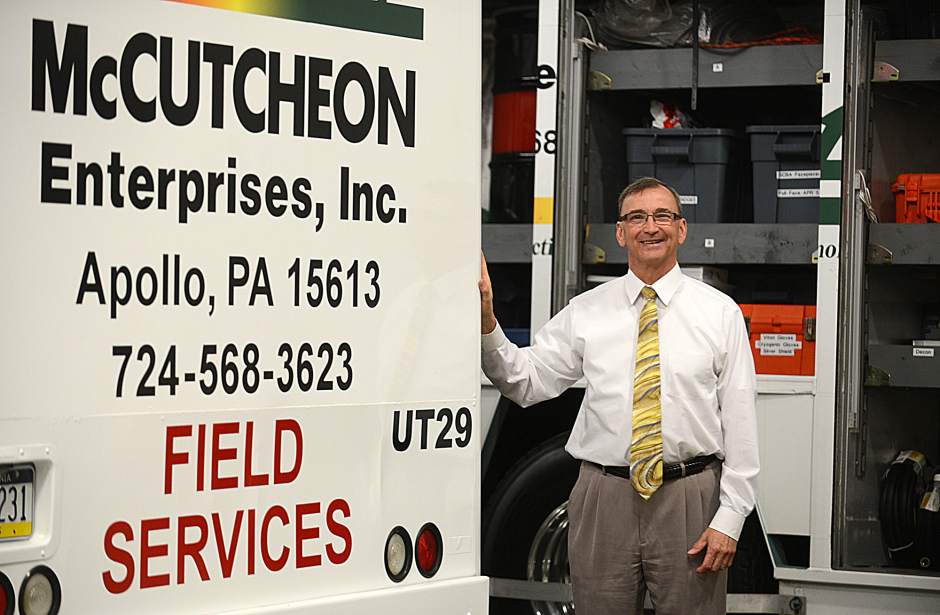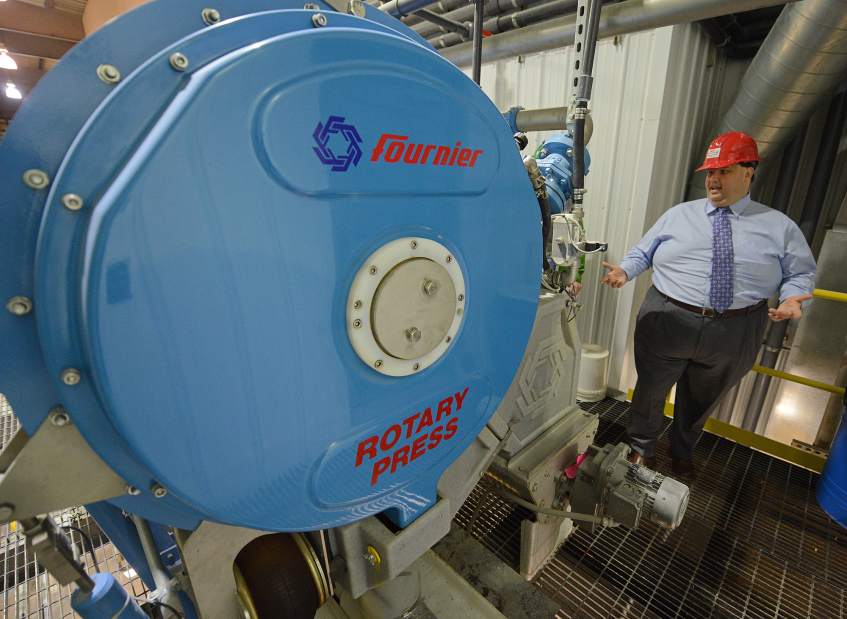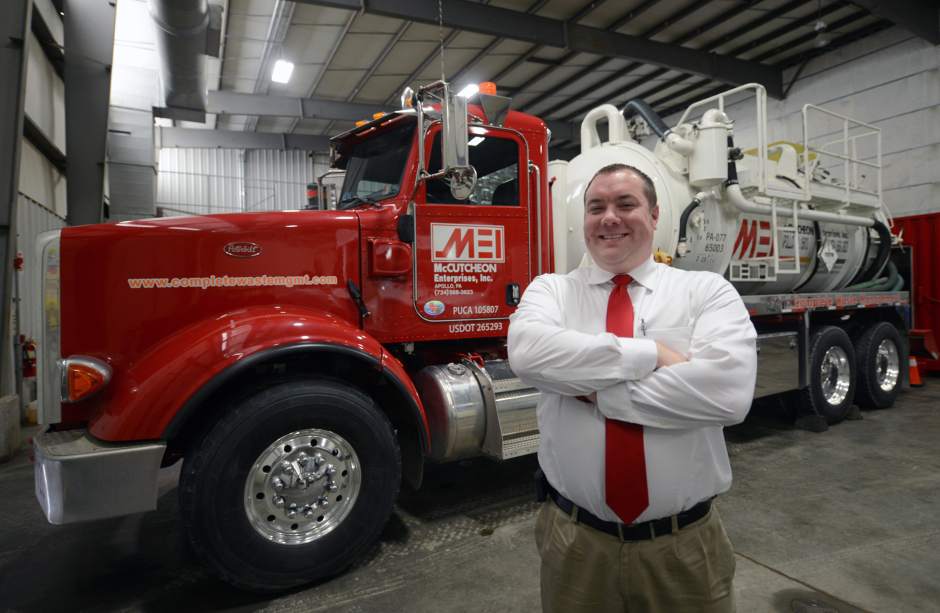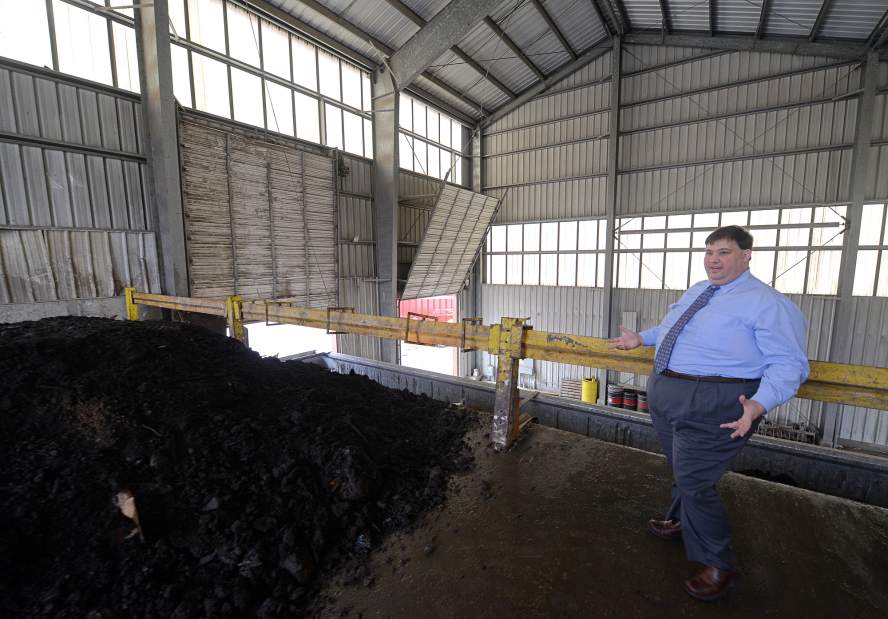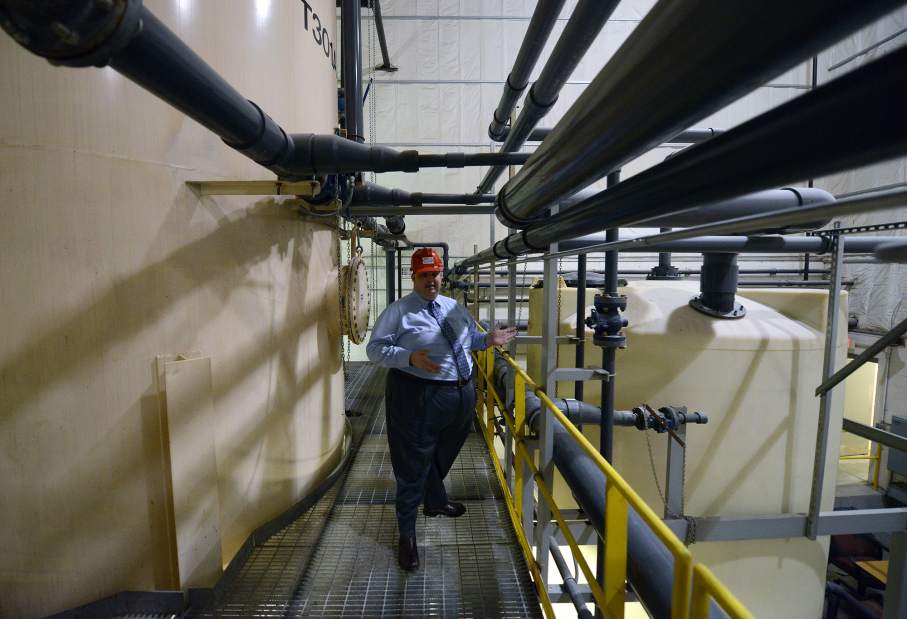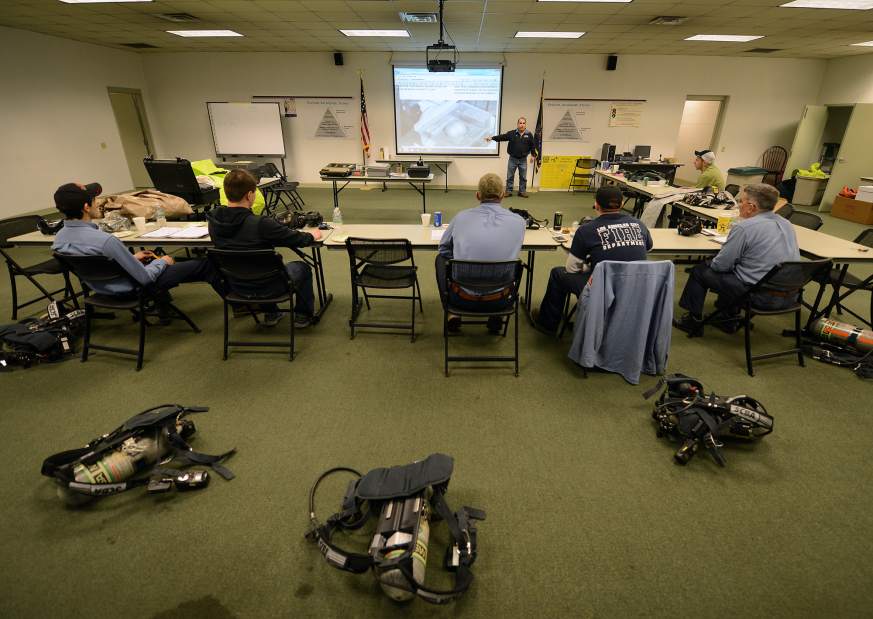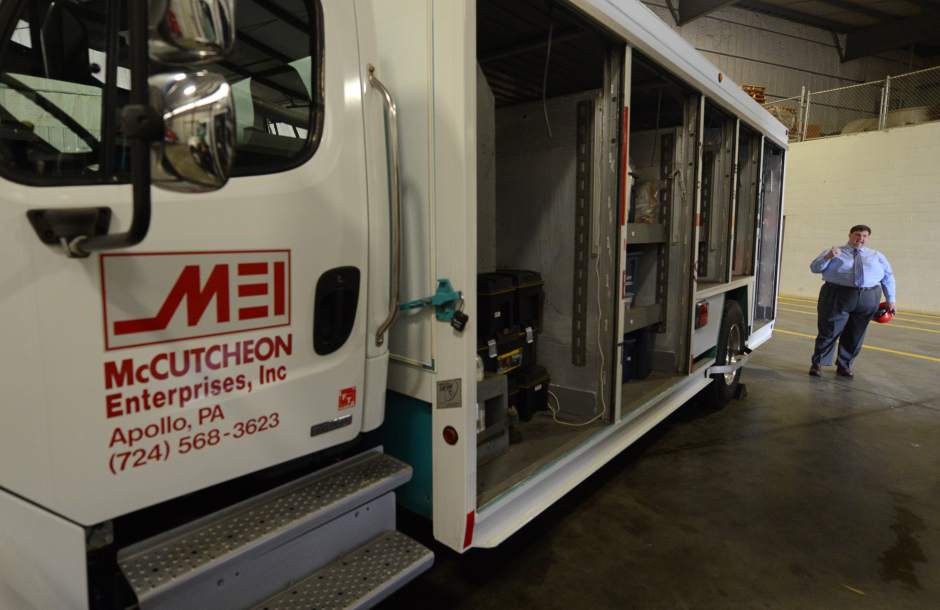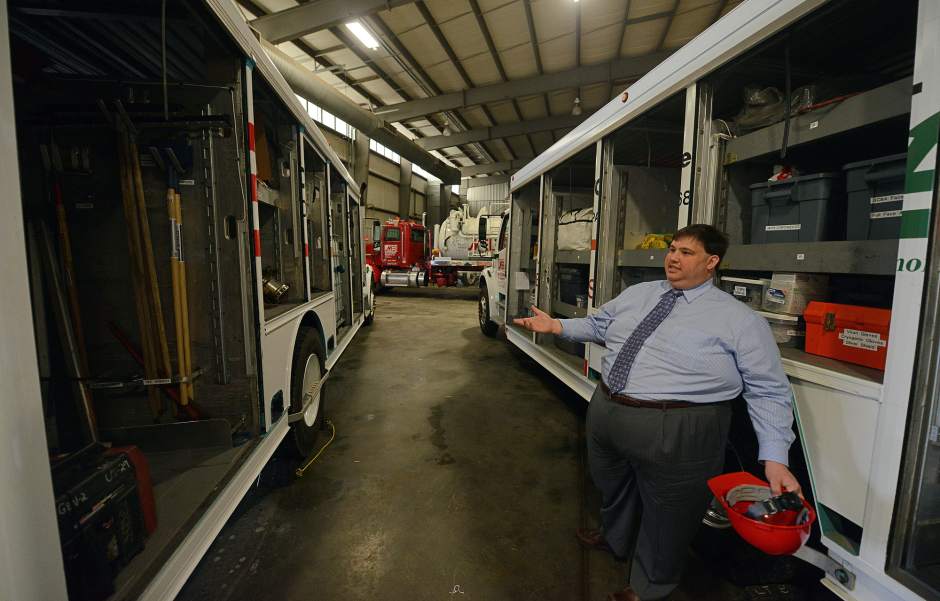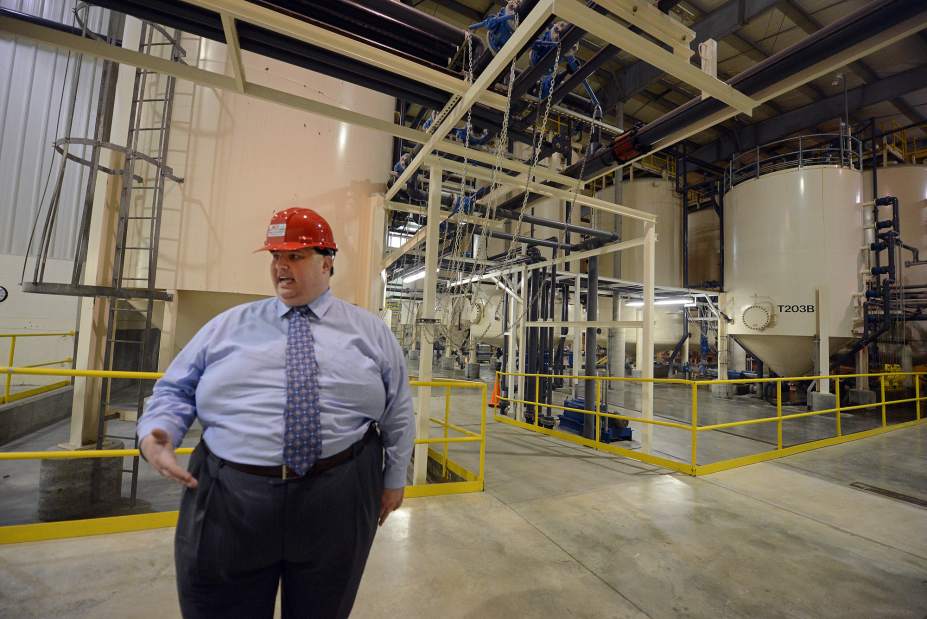Waste handler McCutcheon Enterprises thrives as oil, gas industry shifts
A trip around the sprawling lots and cavernous garage bays at McCutcheon Enterprises Inc.'s hilltop headquarters in Westmoreland County gives the first hint at how many services the family-owned waste management company offers.
The rows of equipment include custom-built vacuum trucks, 10,000-gallon square tanks, trailers full of hazmat response gear, huge boxes that can roll off trailers, excavators and even boats. Inside the treatment plant, a network of tanks and pits allows the company to treat solid and liquid wastes for disposal or reuse.
“We want to be a one-stop shop for customers to handle their waste from cradle to grave,” said company spokesman Chad McCutcheon, whose grandfather and great-grandfather started the Allegheny Township business in 1947.
Flexibility in offering different services to various industries is key at MEI, said Chad's father and company President Calvin McCutcheon, who has guided the company through an expansion since taking the reins in 1989.
“When one sector slows down, the next piece picks up,” he said, noting recent shifts in the oil and gas industry that had given MEI a boost in business over the past decade. Drillers have slowed activity in the face of low prices since last fall, but pipeline builders are more active, filling any potential gap in work.
The private company declined to provide any financial figures, but steady growth is evident. When Calvin McCutcheon became president, the company had 30 employees and 25 vehicles. Ten years later, it had 80 employees.
Today it has 125 people handling a fleet of 180 vehicles between the Allegheny Township campus and an equipment rental business it bought in Houston, Pa., from Myzak Hydraulics in 2013.
That location, run by Chad's brother and Calvin's other son, Nathan McCutcheon, allows MEI to compete with companies that moved there to serve the surrounding Marcellus shale operations, Calvin noted.
The company relies on both planned and unplanned business; MEI contracts with drillers, plants and other clients to process and dispose of their industrial waste, but has state-certified hazmat response teams and equipment. The company responds to hazardous spills in eight counties and half of the Pennsylvania Turnpike.
“We can go out to handle the emergency part, but move seamlessly into cleanup without them needing to call another contractor,” said Bill Krulac, a former state police official who joined MEI several years ago to lead its hazmat activities and training.
One call last year led to a cleanup and remediation job that has lasted nearly 10 months. When a Statoil gas well pad in Clarington, Ohio, caught fire June 28, MEI was called to provide equipment and help contain water mixed with 16 different chemicals being used on the pad.
A crew of five MEI employees and several pieces of equipment remain as they work with Statoil on longer-term maintenance of water runoff and disposal.
“They helped me design and implement and install an automated rainwater collection system that got praise from the regulatory community,” said Don Edgington, a company representative for Statoil overseeing the pad.
“It's not just what I commission them to do, but they advance it further,” he said of MEI's value-added approach.
The work on the Statoil pad and at an XTO gas processing plant in Butler County helped MEI earn the Oilfield Services Company of the Year honor last month during the Northeast Oil and Gas Awards in Pittsburgh, an industry-sponsored event.
“A lot of companies have a bigger footprint in the business, but the word of mouth on (MEI) is good,” Edgington said.
The expanding fleet of vehicles and rental equipment is helping MEI grow that footprint. But the family has increased the capacity and added features to the treatment plant to serve industrial, municipal and residential clients.
Since the plant opened in 2001, MEI quadrupled the capacity of pits at which it can solidify semi-liquid wastes such as drilling muds and cuttings so they can be taken to landfills. Nearly two years ago, it added waste reduction equipment that separates liquids from solids in a waste stream. The liquids are then treated for reuse in drilling fluids or other uses, and less material is sent to the landfill.
The treatment for reuse happens in an area added in 2010 at which MEI can clean for reuse 180,000 gallons of fracking fluid per day. That area sits beside what MEI called Discard Depot, an operation it began 10 years ago where people, businesses or municipal governments can pay to dispose of any non-hazardous waste at a per-pound cost.
It can be a dirty business, though most of the treatment plant remains remarkably clean.
“Just because we're dealing with waste doesn't mean we have to look like it,” Calvin McCutcheon noted.
The company keeps it safe through constant training in a classroom that can seat 200 people, and at which it teaches other companies' employees. MEI workers are certified not only to work in enclosed spaces, but to rescue others from them.
On the list of mobile and in-house services MEI provides, through a planned contract or sudden emergency, Calvin McCutcheon wants to offer piece of mind to clients.
“Sometimes, things go wrong in these industries, they get something that needs to be addressed, and we can suit up and take the pressure off,” he said, standing beside a hazmat response vehicle that's equipped and ready to roll like a fire truck. “These people talk to others in the industry and they come to us, which makes us very proud.”
David Conti is a staff writer for Trib Total Media.

